Here are the best stories we came across last week…
Bike shop boycott: Efforts in the bicycle industry to boycott companies with ties to the National Rifle Association continue spread. UK-based industry outlet BikeBiz is covering the story closely and reports that Canada’s five million member strong Mountain Equipment Co-op (their version of REI) might announce their boycott today. In Portland, news of local shops dropping the NRA-connected brands was picked up by KOIN (CBS) and KPTV (Fox).
On being normal: Eben Weiss writes in Outside about how his experience riding a big cargo bike have helped him see just how “retrograde” American attitudes are toward bicycles.
Wake up, Democrats: Just because a politician has a “D” next to their name does not mean they can be counted on to push for transportation policies and projects that help slow climate change.
20 is plenty inspiration: Four years after instituing 20 mph zones in Bristol, a study from the University of West England has found that people are driving nearly 3 mph slower on average. Might not sound like much, but it has likely saved four lives a year.
The struggle is real: Using a story subject that spent a half-hour searching for a parking spot only to drive home and walk four blocks to school, campus newspaper The Beacon reports that despite having over 1,700 parking spaces for students, University of Portland officials are eager to add more.
Better bike lanes: Los Angeles is sick of paying out settlements to people who sue over poorly maintained bike lanes — so they’ve decided to take better care of them and set-aside money to keep them in tip-top shape.
Advertisement
Cars are the problem, part 9,876: The incessant din of car engines in cities could be making you sick. This piece in The Atlantic traces the issue of environmental noise back over 100 years.
Go ahead and Jump: One stat jumped out at us from this Wired piece on S.F.’s fleet of Jump e-bikes: Each one in the 250-strong fleet are averaging four rides per day — a very strong number given how new the system is (Biketowns get around one ride per day, by comparison).
Oboi Reed is not messing around: Equiticity and Slow Roll Chicago founder Oboi Reed is on a massive global tour to spread his message that bicycles can be a powerful tool used to build community and create equality among diverse groups of urban-dwellers. And he’s coming to Eugene on May 24th!
Transit in Wakanda: U.S. transportation wonks are glowing over the transit featured in the hit movie Black Panther. Author and former NYC DOT Commish Janette Sadik-Khan tweeted “It’s one of the first movies to get urbanism right.”
Dirty EVs: Another reason cities should go all-in for walking and biking and transit is that the demand for EV batteries has been linked to deadly mines and child labor in Africa.
Speed bumps for bicycles: Perth is testing “speed control devices” aimed at slowing down bicycle riders on a popular path.
— Jonathan Maus: (503) 706-8804, @jonathan_maus on Twitter and jonathan@bikeportland.org
Get the Monday Roundup delivered directly to your inbox.
BikePortland needs your support.


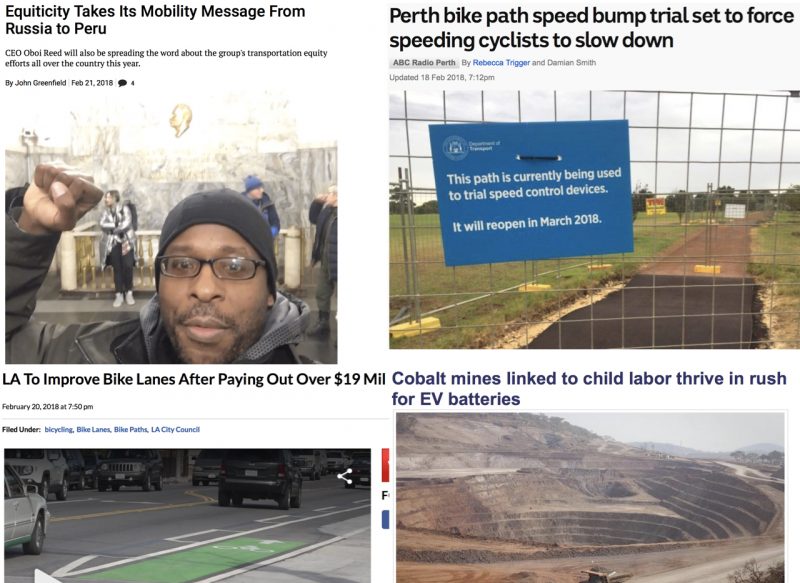
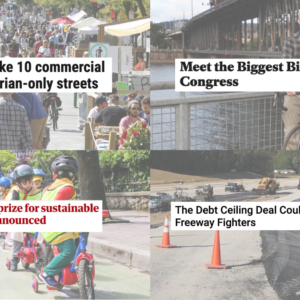
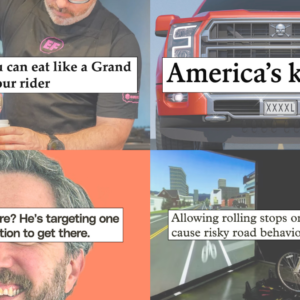
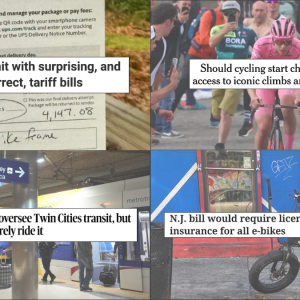
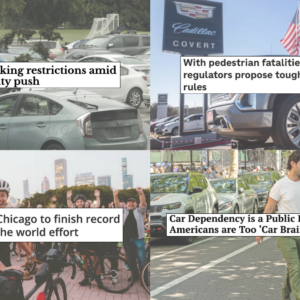
Thanks for reading.
BikePortland has served this community with independent community journalism since 2005. We rely on subscriptions from readers like you to survive. Your financial support is vital in keeping this valuable resource alive and well.
Please subscribe today to strengthen and expand our work.
To stay consistent, I think a boycott on EVs needs to happen now. Do we know which companies are directly benefiting from this? Also, what’s the implication for e-bikes which use lithium ion batteries? I can’t imagine it would be much better.
I was going to say- don’t E-bikes have the same battery / child labor problems as EV’s? These problems can be solved — but I don’t think a boycott will solve them. It might help shed more light on the issue though
It’s not that they don’t have the same problems as EVs, but e-bikes don’t have them to the same degree. A typical e-bike battery is 1 kWh or smaller. EVs start at about 24 kWH and go up from there (as big as 100kWh in Teslas).
It should be pointed out that Cobalt mining is also a problem for laptops, cellphones and all of our other rechargeable devices. For numerous reasons, EVs use different lithium chemistries than these smaller devices. Laptops and cellphones use Lithium Cobalt Oxide, which has high energy density (allowing our devices to be small and lightweight), at the expense of a short lifespan, greater risk of fiery thermal runaway and high proportion of cobalt.
The Nissan Leaf, easily Portland’s #1 EV, has changed chemistries over time: Lithium Manganese Oxide originally, then Lithium Nickel Manganese Cobalt Oxide to help with its properties in hot climates, and the forthcoming 2nd gen Leaf will use a new variant of the latter produced by LG that significantly reduces cobalt, precisely because it is expensive. Most EVs are currently using LMNCO chemistry, although Honda and Mitsubishi use Lithium Titanate, and Tesla uses Lithium Nickel Cobalt Aluminum Oxide. All of these chemistries and have different properties, and use varying amounts of cobalt.
Just trying to point out that although small devices and EVs all fall under the “lithium-ion” umbrella, contrary to popular belief they are not using the same kind of batteries, and automotive applications use proportionally less cobalt, although obviously there is a lot more cobalt in a Leaf than in your laptop.
http://batteryuniversity.com/index.php/learn/article/types_of_lithium_ion
“e-bikes don’t have them to the same degree”
so a little bit of terrible working conditions is better than a little bit more?
I’m having trouble following the logic by which something that we come to understand as bad in a variety of readily appreciated ways is not so bad if the thing in question only uses a little of the thing that is so bad? Weird.
Frankly child labor is not the worst of it. Have you read Michael Klare’s now not so new book The Race for What’s Left?
https://us.macmillan.com/books/9781429973304
If you can’t distinguish between differences of degree, it’s hard to make useful moral choices in life. If using Lithium batteries is evil, I hope you didn’t type that on a cellphone or laptop.
Also, there are lots of consumer products that involve using materials sourced using terrible working conditions. Like chocolate? But again, if we can’t have a conversation about differences of degree, I hope you’ve combed your life to make sure you don’t use any quantity whatsoever of products that cause suffering.
“I hope you’ve combed your life”
This is an unfortunate but common rhetorical move. You are here conflating the speaker’s imagined (in)consistency in how they have managed the social or cultural expectations around problematic products, with categorical statements about how we as society should make sense of the predicaments we have saddled ourselves with. The two are of course related but the matter before us has *nothing* to do with whether I eat chocolate or use a cell phone. You know nothing about how I make consumer choices related to lithium or greenhouse gases or child labor, and what’s more it doesn’t affect the question before us which is how we should make sense of these challenges, fix the problem, or recognize how we are complicit and must change course altogether.
Instead of engaging the substance of the critique this move is intended to silence the speaker. Not very democratic or interesting.
That’s not consistent.
I have not heard about any response from REI to the boycott of Giro, Bell, Blackburn, Camelpak, or Bolle. As an REI member, I have urged them to drop carrying these brands and I suggest other BP readers do the same. If MEC and REI were to drop these brands, that could have a big impact.
-Ted
The plot was thickened this morning as the original twitter user (that I saw at least) had another thread today detailing the political donations of Vista Outdoors superPAC to Utah US Representatives Bishop and Stewart, two mean deamed by Outside Magazine as “Public Lands Enemy #1 (and I presume #2)”. Both of who played roles in the opening up of Bears Ears and Grand Staircase monuments to commercial, agricultural and motorized use.
Seems a no brainer REI would drop them, no matter their stance on the NRA, because they were very vocal about their helping to protect public lands. Which Vista Outdoor helps unprotect.
From the University of Portland Story. “She had to drive home and walk the 4 blocks to school.” What? If U of P is trying to provide enough parking so that students who live a few blocks away can drive to campus then something is wrong. When I went to college there was no student parking on campus without a specially obtained handicap permit.
When I read that, I scrolled back up to the top of the article to see if I was reading The Onion.
It looks like the boycott has brought the trolls to leave one star reviews for the shops mentioned on at least Yelp and Google. Might do some good to counter that with some legitimate reviews.
If you are worried about cobalt in EV batteries keep in mind the same minerals are used for all lithium based batteries which are used in cell phones, laptops, rechargeable bike lights, electric bicycles, gps units, etc. For that matter cobalt is very common in steel super alloys used in jet engines, machine tools, and magnets. It will be very hard to boycott cobalt containing products unless you are willing to go back to the bronze age.
The cobalt supply chain should also give us a wakeup call for another reason. Yes, the way it is now mined ( along with many rare earth metals) is cause for concern, but so is that fact that it is found in few places and relatively rare. At its current rate of use in Lithium Ion batteries, for all the uses described above ,we may a little more than 5 years of supplies in economically extractable deposits. Unless we have another viable battery technology on the horizon that is not dependent on such scarce resources we might want to think twice about putting batteries in everything under the sun.
We do have other viable battery technologies right now, not merely on the horizon. The cobalt-free ones (Lithium Titanate and Lithium Manganese Oxide) don’t have quite the energy density as the ones with cobalt, but could feasibly be (and sometimes are) used in most kinds of devices. Automobiles are more of a challenge, but this is only an issue for the small number of vehicles that are plug-ins. Most hybrids are still using older NiMH technology, not even using Lithium let alone Cobalt.
“Automobiles are more of a challenge”
(inadvertent) Comment of the week?
Not really, It’s fairly obvious that automobiles are one of the more challenging applications for batteries. Which is both why it’s taken so long for them to become widespread, and also why battery technology is improving so rapidly.
The lower energy density of these chemistries doesn’t preclude their use in automobiles. The first generation Leaf (as I mentioned) used one of these chemistries, and the Honda Fit EV uses the other. They’re a little less optimal, and if we
“ran out” of cobalt it would still be feasible to build EVs using them.
Except that the automobile as a solution to our transportation is finished, obsolete, untenable, no longer something we can or should try to rescue. And it doesn’t matter whether the vehicles we are talking about are more or less efficient, privately owned or shared, or driven by bipeds or autonomous, or powered by an internal combustion engine or an electric motor powered by fossil fuels or even hydrogen (also derived from fossil fuels in the real world). The future (like the past) will be human powered.
We can wish it were otherwise, but that is not going to be nearly enough to renew the automobile’s lease on life for another generation.
US gets almost all of it’s mineral commodities from overseas now, multinational mining corporations and conglomerates have some of the worst human rights records in the world, Vancouver BC is a very popular city for the Canadian corporate mining giants to set up HQs in.
Congo.
Which, yet again, goes to show that we in the First World enjoy most if not all of our modern conveniences at the relative expense of those in the Third World.
relative?
I think it is actually quite unmitigated.
I can’t understand why any able bodied person would drive four blocks rather than walk, but hey that’s me, especially as she ended up walking anyway. I think UP (and all institutions for that matter) should not issue parking passes to able bodied people who live within walking distance of the University.
I’m torn between laughing and crying over this story. How did we get to such a place where large percentages of our fellow citizens are incapable of conceiving of getting anyplace without getting into a car? I’m beginning to think the moon landing was faked. The same society that did that cannot possibly be the one I’m currently living in. For that matter, perhaps the whole Oregon Trail thing is fake too.
I at first was wondering if it was a parody website or something too.
But you know, I once had a roommate who would drive two-thirds of a block to the corner store every morning to get his sandwich. He would drive the three blocks to the bar (and back drunk.) Meanwhile he considered me to be kind of weird because I would walk ten blocks or bike for 45 minutes to go shopping.
I suspect it is cultural. When an institution offers a bachelor degree for roughly 5x the (in-state) and 2x (out-of-state) tuition costs of the state schools, it tends to attract students from wealthier, more privileged families, i.e. individuals who think exercise should be done because one wants to rather than because one must.
I think it is more of a matter of ” if you provide it they will come.” Both my sons went to private east coast universities that are at least as swanky as U of P. In both cases the on-campus parking available to students was zero . They both spent 4 years learning to walk, cycle and take public transit and to this day neither of of them drives or owns a car and they are now in their late 20’s.
I would say that expecting to make such a trip by car is itself a “privilege”, completely aside from one’s family circumstances or background.
I had experiences just like Eben Weiss described just yesterday. All I did was bring my flatbed cart into Costco. It holds two very large plastic tubs with lids just perfectly, so I toss my purchases in as I go, which this time included three smaller plastic tubs with lids to stack on top so that all my purchases can arrive home nice and dry. No fewer than eight people stopped me in the store to comment positively on my cart. It creates a weird positive feeling that people enjoy seeing human powered tools combined with sadness that such things should be considered extraordinary.
After dozens of trips to Costco, I’m still waiting to see someone with an SUV walk out with a bigger load. I wonder if the motorists notice that the people on bikes can carry more than they can.
The Democratic party’s failures on climate change and transportation is something we will have to get a grip on soon. I’m still having mildly tense back-and-forth email exchanges with my state representative and state senator over the extremely flawed transportation bill that passed last year. They were astonished to have constituents take them to task for what they had done; they really thought they were doing a good thing.
Oh well, if they were surprised that they have constituents that think climate change is important beyond being used as a virtue signal, I guess I’ve accomplished some small thing by reaching out to them.
I’ve known many people who would drive one block to go somewhere. In fact, I’ve been offered rides that short and when I politely turn them down, I often get “Are you sure?” types of responses.
At busy drive thrus, you’ll frequently see a 20+ minute wait but someone could walk right in and be served immediately (i.e. even if they want to consume in the car, it’s way faster to walk in).
As someone who has strongly encouraged others to be active as long as I can remember, in my experience, the #1 thing that prevents people from starting is fear of judgment — this is especially true with women.
Those wanting new converts to active transit might want to keep that last bit in mind. If you want to help bring about change, you need to connect in a way that makes sense to those you want to influence, not yourself. Preaching to choirs and howling at the moon is fun but doesn’t lead to change.
“At busy drive thrus, you’ll frequently see a 20+ minute wait but someone could walk right in and be served immediately (i.e. even if they want to consume in the car, it’s way faster to walk in).”
I think this used to be true, but many franchise drive thrus have performance metrics based on how quickly they serve people in cars, with no such metrics for people on foot. They want to clear the drive thru lines to encourage additional business, and nobody can see the people waiting inside. Last time I walked into Taco Bell, I watched ~10 cars get served in the time that that they took to serve me.
“Large payouts in 2017 included $7.5 million for bicyclist William Yao, who was left a quadriplegic following a crash blamed on a substandard street. Yao’s attorney said he obtained copies of reports that showed the city had received complaints about the condition of the bike lane where the accident occurred, and that an inspector had been sent out to the site, but nothing was done.”
Be sure to send in complaints about unsafe bike lanes to safe@portlandoregon.gov
You could save someone from becoming a quadriplegic. Or help out someone who is is injured, quadriplegic or not, when they crash in an unsafe bike lane. Or you could help force the city to maintain its bike lanes better. Or all three…
Do you know if that’s a PBOT email address? Or if it would work for streets and paths that Parks controls? I’ve had poor luck trying to get Parks to respond to safety and accessibility/safety issues.
Thanks for beating the drum, Ted!
–I got a callback from the city responding to my report on a collapsed pavement repair in the 1100 block of SW 2nd Av., right hand lane, but no fix. Guess I’ll keep using the 60 mm tires. Bibendum!
Western Australia DoT calls those speed bumps; but any mountain biker will instantly recognize them as “doubles”. Braaap!
I thought the same thing. A linear paved pump track? I’m in!
Since I’ve disappeared into auto-moderation now I guess you can look forward to seeing my comments in 3-4 days. Weird, I don’t think any of my comments have been blocked recently, if ever.
Hi Dan A,
As of this past weekend, every comment is now moderated prior to being published. It’s not you… it’s us! Seriously though, just trying something new in an effort to make the comments section even better.
Cool, thanks.